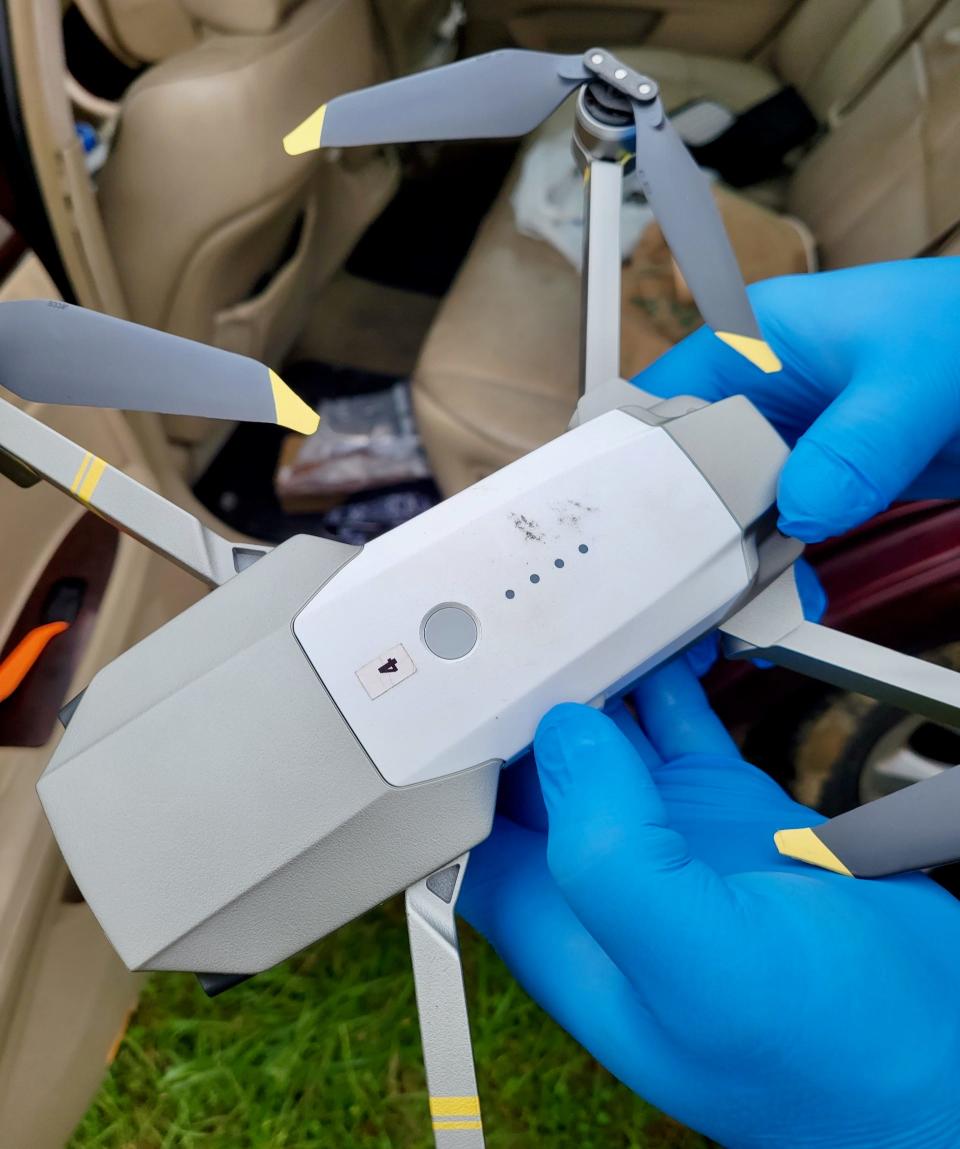Baltimore man first to plead in Maryland Roxbury state prison contraband conspiracies
A Baltimore man is the first of 15 defendants to enter a plea bargain after he was indicted in connection to various conspiracies to smuggle contraband into Roxbury Correctional Institution south of Hagerstown following a lengthy investigation last year.
Maryland Attorney General Anthony G. Brown and Public Safety and Correctional Services Secretary Carolyn J. Scruggs discussed the indictments and conspiracies during a May news conference outside Roxbury Correctional, also known as RCI.
The man who pleaded Wednesday is one of three people indicted, including a then-RCI inmate, related to using drones to smuggle contraband over RCI's fence.
Unsolved Hagerstown murder: 'We got to help them': Murder of Rachela Disandro sparks help for homeless
RCI is a medium-security prison and one of three state prisons along Roxbury Road south of Hagerstown.
Guy Edward Austin Jr., 26, pleaded guilty Wednesday to two misdemeanors in the drone conspiracy. Those crimes were conspiracy to deliver contraband and possession of a telecommunications device (a cellphone) with the intent to deliver it to a place of confinement.

Austin apologized to the court during his plea hearing Wednesday morning in Washington County Circuit Court.
Judge Brett R. Wilson, referencing Austin's comment about a "misunderstanding," asked Austin if he had ever been in a state prison, even on a tour.
Austin said he had not.
Wilson said the "lives of everyone in a prison are constantly under threat."
Adding items of value to that environment can put everyone there in danger because someone might use physical means to take such items, Wilson said. Those in danger include correctional officers and other staff who might be called on to stop such actions.
"What you did served to exacerbate the situation" and create more danger, Wilson told Austin.
Senior Assistant Attorney General Jared Albert told Wilson earlier that supply and demand in a prison can multiply a contraband item's worth by 10 or 100 times its street value, often leading to fights, disputes and violence.
Judge 'not crazy about' plea deal
Wilson said he was "not crazy about it," but agreed to the sentence recommended by the attorney general's office in the plea deal.
For the telecommunications device charge, Austin was sentenced to 5 years in state prison with all suspended but 90 days and credit for 71 days already served.
Wilson also sentenced Austin to a consecutive three years in state prison for the conspiracy charge, but suspended all of it.
Once released, Austin will be on supervised probation for three years. Probation conditions include not using any type of drone and not being on the property of any place of confinement such as a prison, jail or holding center.
Public defender Robert Kline, noting how quickly Austin admitted to his mistake in reaching a plea deal, asked Wilson to consider time served.
With an active 90-day sentence and 71 days already served, there's a chance Austin could be released before he reaches 90 days if he has good time credit.
After the hearing, Kline said Austin acknowledged his mistake and is "certainly happy to put this behind him." Austin will serve his remaining time and go home to his family and back to work, Kline said.
Albert told Wilson that Austin had no prior criminal record the state is aware of and his accepting responsibility worked in his favor regarding the recommended sentence, which is largely suspended time.
But Albert also said it seems that even after this incident, Austin continued this type of behavior regarding another prison in Baltimore.
Albert called the incidents with the drones a "very serious offense" and told Wilson that perhaps Austin didn't understand that at the time because it seems he's a "drone guy" and has flown drones recreationally.
Using a drone to smuggle contraband onto RCI grounds
Also indicted in the contraband conspiracy involving using drones is inmate Jose Tapia, who has been transferred to another state prison, and Miya Ann Scott, 25, of Baltimore.
Tapia, 38, is accused of soliciting people via Instagram, offering to compensate anyone willing to fly drones over the RCI fence to deliver drugs and other contraband, Brown said during the May 25 news conference.
Albert said drone activity was detected in the area of a cornfield off Lappans Road, about a mile from RCI, around 6 a.m. Sept. 7.
Officers found Austin and Scott, with Scott holding a drone controller and a drone landing near them, Albert said. She removed her cellphone from the controller as officers arrived.
A search of Austin's vehicle found almost 119 grams of synthetic marijuana, at least four cellphones, earbuds and drone equipment, Albert said.
Officers also recovered a drone and contraband that crashed into a tree the prior day during an attempted delivery to RCI, court records state.
The indictments were the result of a long-term investigation last summer as officials determined unexplained packages coming from midair were dropped by drones, Albert told Wilson.
This article originally appeared on The Herald-Mail: Baltimore man sentenced in prison contraband case involving drone

